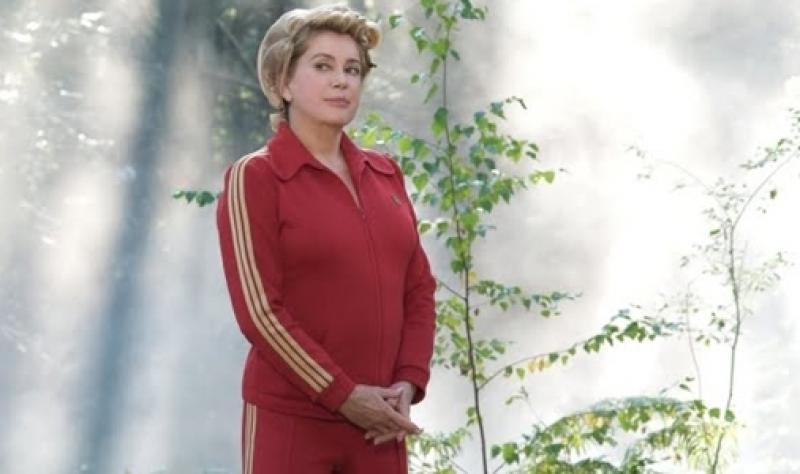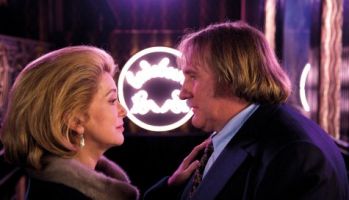Potiche | reviews, news & interviews
Potiche
Potiche
In Ozon’s exuberant farce, Deneuve casts off her trophy wife label

A potiche is a decorative vase but in this demeaning context it refers to a “trophy wife”. In this winsome French farce, from the reliably dynamic François Ozon, the “trophy” in question is the spousal equivalent of the World Cup: Catherine Deneuve.
Potiche is based on the play of the same name by Pierre Barillet and Jean-Pierre Grédy. It’s broadly similar in tone to Ozon’s high-camp murder-mystery musical 8 Women (2002), though those who know him for the raw confrontational emotion of 5X2 (2004), or the simmering sensuality of Swimming Pool (2003), may well be surprised. Despite his somewhat unpredictable directorial style, Ozon is consistently playful – even the aching and unflinching 5X2 is told backwards (perversely but brilliantly), from divorce to attraction, and Swimming Pool, too, is pleasingly twisting and teasing.
Set in the town of Sainte-Gudule in 1977, Potiche begins with a still-luminous Deneuve taking a gentle jog through chocolate-box countryside. Attired in a striking red tracksuit, with her hair set in rollers and covered over with a scarf, she’s the epitome of a bourgeois lady of leisure - carefree and preoccupied with her appearance. As she jogs she has time to bask in the simple beauty of the natural world, in a sequence straight out of a Disney film - until, that is, she spies a couple of enthusiastically amorous rabbits, and the film announces itself as something much cheekier. From here on in, the bar for humour is unashamedly skirting the floor.
 Deneuve plays Suzanne Pujol, the middle-aged wife of manufacturing magnate Robert (Fabrice Luchini). He’s an adulterous weasel of a man, who is carrying on with his assistant Nadège (Karin Viard), amongst many others. He’s also a tyrannical, much-despised employer who is being driven to distraction by the vocal dissatisfaction of his umbrella factory employees. After the revolting workers take him hostage, Robert falls ill and is subsequently packed off for a recuperative cruise. During his convalescence, Suzanne takes charge of the company (which was originally her upstanding father’s pride and joy) and, as a consequence, finally seizes control of her own destiny. She does so with the encouragement of her ex-lover and man-of-the-people politico Maurice Babin (Gérard Depardieu) and the support of her adult son and daughter, Joëlle (Judith Godrèche, pictured above with Deneuve) and Laurent (Jérémie Renier).
Deneuve plays Suzanne Pujol, the middle-aged wife of manufacturing magnate Robert (Fabrice Luchini). He’s an adulterous weasel of a man, who is carrying on with his assistant Nadège (Karin Viard), amongst many others. He’s also a tyrannical, much-despised employer who is being driven to distraction by the vocal dissatisfaction of his umbrella factory employees. After the revolting workers take him hostage, Robert falls ill and is subsequently packed off for a recuperative cruise. During his convalescence, Suzanne takes charge of the company (which was originally her upstanding father’s pride and joy) and, as a consequence, finally seizes control of her own destiny. She does so with the encouragement of her ex-lover and man-of-the-people politico Maurice Babin (Gérard Depardieu) and the support of her adult son and daughter, Joëlle (Judith Godrèche, pictured above with Deneuve) and Laurent (Jérémie Renier).
Suzanne is a role which plays heavily on Deneuve’s previous iconic screen incarnations, in particular Geneviève Emery, the umbrella shop heiress in The Umbrellas of Cherbourg (1964), and the promiscuous bourgeoisie Séverine Serizy in Belle de Jour (1967), themselves trophy wives. Is Ozon, who is (cinematically at least) an inveterate cynic when it comes to marriage, imagining how The Umbrellas of Cherbourg’s radiant ingénue Geneviève’s life might have turned out? She does, after all, marry for security rather than love. Would it too have descended into an unhappy farce?
As the unlikely trailblazer Suzanne, Deneuve is on fine form, visibly relishing the character’s reinvention. From her fuller figure and stilted dancing to her delicate jogging she’s not quite as spookily preserved as some of her peers, and looks all the better for it. It’s liberating in itself to see a once so icily remote actress joyously let rip in her autumn years, something Deneuve seems to be making a habit out of.
 Unfortunately, the legend that is Gérard Depardieu is confined to the sidelines and, though he’s appropriately cast as a romantic agitator, Maurice is desperately underwritten and seems to exist purely to provide Deneuve with a frisson-generating foil. Though the pair don’t quite sizzle on screen, there is a certain amount of charm to their dynamic. It’s always a pleasure to see these two collaborate and terrific seeing them perform a choreographed dance routine. (A more emotionally interesting recent collaboration between the two was 2004’s worthy, yet little seen, Changing Times.)
Unfortunately, the legend that is Gérard Depardieu is confined to the sidelines and, though he’s appropriately cast as a romantic agitator, Maurice is desperately underwritten and seems to exist purely to provide Deneuve with a frisson-generating foil. Though the pair don’t quite sizzle on screen, there is a certain amount of charm to their dynamic. It’s always a pleasure to see these two collaborate and terrific seeing them perform a choreographed dance routine. (A more emotionally interesting recent collaboration between the two was 2004’s worthy, yet little seen, Changing Times.)
Potiche can be a little squirm-inducing; many will find themselves chortling, or even baulking, at the pure outlandishness of it all and, despite its empowering egalitarian political message, it feels surprisingly low-brow. Still, the story rattles along well and the unabashed prurience, terrifically camp visuals and its exuberant sense of fun means that, whilst Potiche might be a touch idiotic, it is, like Deneuve, still irresistible.
Watch the trailer for Potiche
Explore topics
Share this article
The future of Arts Journalism
You can stop theartsdesk.com closing!
We urgently need financing to survive. Our fundraising drive has thus far raised £33,000 but we need to reach £100,000 or we will be forced to close. Please contribute here: https://gofund.me/c3f6033d
And if you can forward this information to anyone who might assist, we’d be grateful.

Subscribe to theartsdesk.com
Thank you for continuing to read our work on theartsdesk.com. For unlimited access to every article in its entirety, including our archive of more than 15,000 pieces, we're asking for £5 per month or £40 per year. We feel it's a very good deal, and hope you do too.
To take a subscription now simply click here.
And if you're looking for that extra gift for a friend or family member, why not treat them to a theartsdesk.com gift subscription?
more Film
 The Amateur review - revenge of the nerd
Remi Malek's computer geek goes on a cerebral killing spree
The Amateur review - revenge of the nerd
Remi Malek's computer geek goes on a cerebral killing spree
 Patrick McGilligan: Woody Allen - A Travesty of a Mockery of a Sham review - New York stories
Fair-minded Woody Allen biography covers all bases
Patrick McGilligan: Woody Allen - A Travesty of a Mockery of a Sham review - New York stories
Fair-minded Woody Allen biography covers all bases
 Blu-ray: Yojimbo / Sanjuro
A pair of Kurosawa classics, beautifully restored
Blu-ray: Yojimbo / Sanjuro
A pair of Kurosawa classics, beautifully restored
 Mr Burton review - modest film about the birth of an extraordinary talent
Harry Lawtey and Toby Jones excel as the future Richard Burton and his mentor
Mr Burton review - modest film about the birth of an extraordinary talent
Harry Lawtey and Toby Jones excel as the future Richard Burton and his mentor
 Restless review - curse of the noisy neighbours
Assured comedy-drama about an ordinary Englishwoman turned vigilante
Restless review - curse of the noisy neighbours
Assured comedy-drama about an ordinary Englishwoman turned vigilante
 Ed Atkins, Tate Britain review - hiding behind computer generated doppelgängers
Emotions too raw to explore
Ed Atkins, Tate Britain review - hiding behind computer generated doppelgängers
Emotions too raw to explore
 Four Mothers review - one gay man deals with three extra mothers
Darren Thornton's comedy has charm but is implausible
Four Mothers review - one gay man deals with three extra mothers
Darren Thornton's comedy has charm but is implausible
 Misericordia review - mushroom-gathering and murder in rural France
A deadpan comedy-thriller from the director of ‘Stranger by the Lake’
Misericordia review - mushroom-gathering and murder in rural France
A deadpan comedy-thriller from the director of ‘Stranger by the Lake’
 theartsdesk Q&A: filmmaker Joshua Oppenheimer on his apocalyptic musical 'The End'
The documentary director talks about his ominous first fiction film and why its characters break into song
theartsdesk Q&A: filmmaker Joshua Oppenheimer on his apocalyptic musical 'The End'
The documentary director talks about his ominous first fiction film and why its characters break into song
 DVD/Blu-ray: The Substance
French director Coralie Fargeat on the making of her award-winning body-horror movie
DVD/Blu-ray: The Substance
French director Coralie Fargeat on the making of her award-winning body-horror movie
 A Working Man - Jason Statham deconstructs villains again
A meandering vehicle for the action thriller star
A Working Man - Jason Statham deconstructs villains again
A meandering vehicle for the action thriller star
 The End review - surreality in the salt mine
Unsettling musical shows the lengths we go to avoid the truth
The End review - surreality in the salt mine
Unsettling musical shows the lengths we go to avoid the truth

Add comment